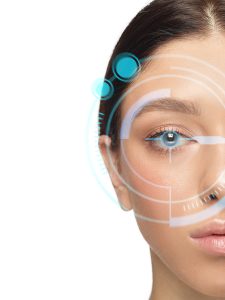Editor’s Message
*This is an article from the Fall 2022 issue of Contentment Magazine.
Cynthia Ackrill, MD, PCC, FAIS
Editor
Many of us have a love/hate relationship with technology. “Invalid password” is enough to send blood pressures soaring, but technology has always played an important role in healthcare, giving us ways to “look under the hood” of human functioning for diagnosis and treatment. Technology helps us measure aspects of our physiology (blood pressure, blood sugar, heart rate patterns, brainwaves, etc.) that we can’t guess accurately. And as it advances it offers ways to move beyond measuring, to help build awareness, track progress, and even train and treat aspects of our physiology to reduce symptoms, raise resilience, and enhance well-being.
The world of healthcare technology marketed for stress management is exploding, making it challenging to know what really works and how. This issue of Contentment explores the theories behind some commonly used versions of tech to help you understand and pick more wisely. We couldn’t begin to provide enough tomes of articles to address all the choices out there, but it is best to start with some basics. Future issues will dive into other forms of biofeedback and neurofeedback and even some virtual reality options. I am so proud of The American Institute of Stress (AIS) for helping us navigate the overwhelming options to find the evidence-based choices we can trust.
Evian Gordon MD, PhD, FAIS, Donna Palmer, PhD, and Jennifer Franklin provide an overview of the dynamics of stress, common technologies used in stress management, as well as a proven 3-step structure to optimizing the benefits of using technology: Assess-Train-Track. Based on decades of data, they help you move beyond understanding the science (knowing) to doing, so you not only feel better but are inspired to continue healthy practices.
Charlie Grantham, PhD, MSH, FAIS, APF delivers another thought-provoking article tracing the history of biometrics back to the early lie-detector, through several of the more common products in use today, and then looks forward to what is coming soon as Artificial Intelligence (AI) and bots expand our options for the future. He also proposes ‘scripts’ or choices for what to do with your biometric information to develop greater awareness, resilience, and well-being.
Marcia Uddoh MD (candidate), PhD, MPH, MS, MSW, FAIS, a new contributor, takes a deep dive into the science of Heart Rate Variability (HRV) and its relationship to the autonomic nervous system. She includes studies showing the positive impact of nature on HRV. We instinctively know that being in nature contributes to improved well-being, and it is fun to consider scientific proof of nature’s role in helping to mitigate stress.
While many forms of technology require active mental participation for results, Josh Briley, PhD, BCMAS, FAIS gives us an overview of one that provides results without feeling pressured to add one more practice into your already overwhelmed life. The use of microcurrents is not new but is growing and with good reason — tons of evidence-based research. This article reviews the theories underlying this non-chemical approach to stress (and pain) regulation.
With any complex issue there are built-in tensions of views with upsides and downsides — the key is to leverage the benefits and wisdom of each point of view. Our self-identified contrarian, Frank Forencich, DAIS, offers a look at the downsides of technology. Is it undermining our human capacity for internal awareness and the enormous benefits of deep listening? How can we stay aware of when technology is truly helping vs. causing more stress? For all of us who’ve lost brain cells and precious time in “password hell” this is a great thought piece.
Lewis Coleman, MD, FAIS has true genius for diving into history and research to tease apart the relationship between different parts of a puzzle, as illustrated in his landmark discovery of the mammalian mechanism of stress, summarized in this past winter’s Contentment. In this issue he analyzes the scary trend in decreasing longevity, looking at the relationship between environmental stress and disease and the powerful role of corporations in increasing the toxins to which we are exposed. Truly alarming and impetus for us all to speak up!
And finally, we are adding a new column to Contentment: What We Are Reading. The market is bursting with new books to help us understand the inner workings of our physiology and psychology and how they are entwined, books that explain, offer solutions, and inspire us to stay curious and practice healthier habits. Being human is not always easy and finding contentment along the way can be challenging. We all need steady doses of motivation on the journey. Heidi Hanna, PhD, FAIS gives us a look inside the new release from one our contributors, Evian Gordon, MD, PhD, FAIS, THE BRAIN From Knowing to Doing! Check it out!
Our next issue will explore the critical interplay of stress and sleep. Until then, please enjoy this look at the world of stress management technology from our impressive experts!
![]()
